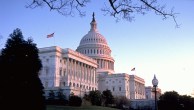Seven ordained ministers hold seats in the new Congress – one more than the number in the very first U.S. Congress (1789-1791).1 But because Congress was a much smaller body in the late 18th century than it is now – there were 91 members in the first Congress, compared with 535 voting members today – clergy accounted for a far greater percentage of the total membership (nearly 7% in the first Congress vs. 1% in the 114th Congress).
There is no authoritative count of the total number of clergy who have ever served in Congress. But it appears that all the ordained clergy who have served in Congress over the past 225 years have been Christians, and almost all of them have been Protestants.
The first speaker of the U.S. House of Representatives – Frederick Muhlenberg of Pennsylvania – was a Lutheran minister. Muhlenberg, who served in Congress from 1789-1797, was one of at least nine ministers or pastors to serve in the Continental Congress. The others were Benjamin Contee of Maryland, Abiel Foster of New Hampshire, James Manning of Rhode Island, Joseph Montgomery of Pennsylvania, Jesse Root of Connecticut, Paine Wingate of New Hampshire, John Witherspoon of New Jersey and John Joachim Zubly of Georgia. Contee, Foster, Muhlenberg and Wingate went on to serve in the U.S. Congress.
The first African American to serve in Congress was a minister in the African Methodist Episcopal Church (AME). In 1870, less than five years after the end of the Civil War, the Rev. Hiram Rhodes Revels was elected by the Mississippi Legislature to fill a vacant seat in the U.S. Senate as a Republican.2 Democrats in Congress tried to block Revels from taking office, arguing, among other things, that Revels had not been a U.S. citizen until the 14th Amendment was adopted in 1868.3 Revels’ own party rallied around him, however, and he was finally sworn in on Feb. 25, 1870. He served until his term expired in 1871.4
Another AME minister, the Rev. Richard H. Cain, also served in Congress during Reconstruction following the Civil War. Cain was a Republican representative from South Carolina from 1873-1875 and then again from 1877-1879. After his congressional career ended, Cain became a bishop in the AME church.5
Only two Catholic priests have served as voting members of Congress.6
The Rev. Robert F. Drinan, a Jesuit priest from Massachusetts, served as a Democratic member of the House of Representatives from 1971 to 1981. He dropped his re-election bid in 1980 after St. John Paul II, who was then pope, announced that priests would no longer be allowed to hold political office. Under the Code of Canon Law that was in force at the time, Catholic priests were able to hold public office with the permission of church officials. In 1983, the Vatican officially revised canon law to say that “Clerics are forbidden to assume public offices which entail a participation in the exercise of civil power.”7
During his decade as a legislator, Drinan was the first member of Congress to introduce a resolution calling for President Richard M. Nixon to be impeached; he did so in 1973, after the secret bombing of Cambodia ordered by Nixon came to light. Drinan had run on an anti-Vietnam War platform and also supported abortion rights, which some scholars have speculated may have been a factor in John Paul’s decision to change canon law on priests holding public office.8
In 1980 – the year Drinan dropped his re-election bid – the Rev. Robert John Cornell, also a Democrat, pulled out of the race for the 8th District House seat in Wisconsin. Cornell previously had served two terms in Congress, from 1975 to 1979, but lost his seat in the 1978 election. In announcing his decision to withdraw from the race, Cornell said: “It is my personal belief that serving in Congress is no more inconsistent with the priesthood than teaching government and history, as I have done for 35 years.”9
Although no Catholic clergy have served in Congress since 1981, a current member of Congress – Rep. Juan C. Vargas, a Democrat who has represented California’s 51st District since 2013 – is a former Jesuit novice.
No Jewish rabbi has ever served in Congress. Rabbi Dennis Shulman, a Democrat, ran in 2008 for a House seat in New Jersey’s 5th District. He lost the general election to Republican incumbent Scott Garrett 56% to 42%.




